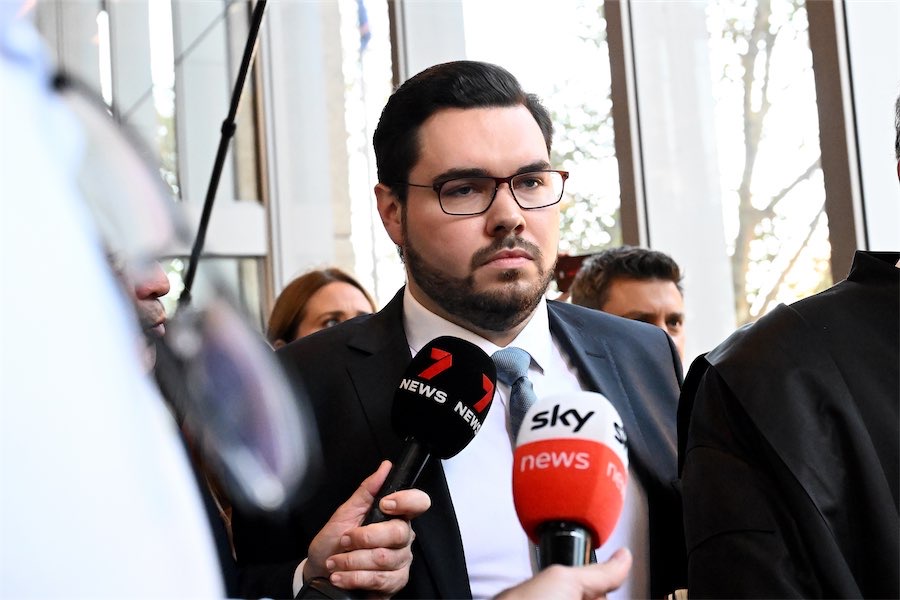Letter writer MAX FLINT says the infill of transport corridors does not depend on light rail, only on an efficient transport mode for the corridor. “This is especially so for Woden from which there is already an excellent corridor, well serviced by buses.”
IT would have been a great pleasure for many long-suffering Canberran taxpayers to read or hear that the Liberal Party is opposed to light rail to Woden.

While the price tag of $3 billion and the opportunity costs that that represents are crucial, they are not the only major case against light rail. The Rattenbury/Barr government gave up long ago the pretence that light rail was about a better transport solution, in favour of it providing for infill of the corridors.
That has always been a false argument on their part because an electric Rapid Bus Transit system (or even the current buses) can achieve the same ends.
Infill of corridors does not depend on light rail, only on an efficient transport mode for the corridor. This is especially so for Woden from which there is already an excellent corridor, well serviced by buses. In the case of Tuggeranong, there are three such corridors already serviced by buses.
As for the Federal government, having promised $218.4 million for the project, that was pure Labor electioneering and contrary to previous advice of Infrastructure Australia.
Minister Chris Steel, in defence against making public the $3 billion cost, presents a nonsense argument that he would release costs and the business case after contracts are signed.
If he were to get away with that, he would then defend whatever the cost on the basis of contractual commitment and confidentiality.
Max Flint, co-ordinator, Smart Canberra Transport
Spades, but no party time?
So only Labor blokes were in attendance to start the sod-turning uplift of London Circuit for 1.7km of light rail construction (“Government blokes offer tram nonsense in spades“, citynews.com.au November 26).
And so began the creation of a bottomless pit of disruption, travel stress and other inefficiencies that for many years to come will also put many off crossing Canberra, or visiting the central city area, for social, cultural and leisure reasons.
While the ACT’s worthwhile adoption of a fossil emblem recently received both ministerial and photographic attention, Labor’s London Circuit spade work seems to have been conducted without happy snaps or publicity about any on-site celebrations to highlight this major infrastructure and urban densification journey that the territory is now embarking upon.
If relevant federal female ACT Labor politicians or local female Labor and Greens MLAs had been invited to help hold a spade back in October, they may have wisely decided to avoid being associated with digging a hole that looks like deepening rapidly for many politicians between now and October 2024.
Sue Dyer, Downer
The best years are gone
A COUPLE of quick thoughts, if I may, to columnist Robert Macklin (“Failure that’s staring us all in the face”, CN November 24).
Robert, do you think humans will ever get it right?
I’m a bit of a fence sitter on climate change, but two things have struck home with me, melting glaciers and the thought that polar bears may go extinct.
In earth’s history, there seem to have been repeated climatic events, long before we came along to foul it. Apparently they’re still destroying the Amazon rainforest. When did you hear any of these climate changers recently mention that children in Africa have been starving for many decades, but we still go on overpopulating. Dick Smith is the only one I recall who has spoken up about it.
It seems a no-brainer that lack of discipline for children is creating a lawless and self-entitled society. In my life, the best years were from 1950 to 1980. How can you stop pollution when people just want more and more?
At the risk of showing my age, the best years are gone.
What do you think of the chances of saving this once wonderful planet?
Cath Smith, via citynews.com.au
Moderate the rhetoric and the violence
HOPEFULLY, letter writer Russel Wenholz (CN December 1) will be happy that I don’t “push the same old barrow”.
After all, there is no need to because there are an excess of barrows. My current concern is the up and coming heavy promotion of the Aboriginal “Voice” and any subsequent referendum.
This really should be a no-brainer, but the antics of Senator Lidia Thorpe, “moving flags” Adam Bandt along with those who burn down the doors of Old Parliament House.
Then we have athletes like Caitlin Moran, as well as the self-promoting Stan Grant and numerous others who think it is obviously not poor form to criticise Queen Elizabeth’s reign when her body was barely cold.
I am a strong believer in a well-run republic, but we have enough divisiveness in parliament as it is without people like these “having a voice”.
Their contributions are not helping matters and as one who worked on Aboriginal and Torres Strait Islander matters, ATSIC and Access and Equity for years, I fear that the Voice will be drowned out unless the rhetoric and the violent demonstrations are moderated.
Ric Hingee, Duffy
There’s no economy without the environment
The “2022 State of the Climate” and the International Panel on Climate Change reports highlight the damage caused by climate change.
Despite overwhelming evidence governments continue to take insufficient action, as the failure of COP 27 demonstrates.
Millions of people and countless fauna and flora have suffered from the environmental and economic effects of increased flooding, storms, droughts and heatwaves.
In countries, including the US and Australia, the issue has been politicised with the fossil-fuel industry successfully gaining the uncritical support of right-wing media and many conservative politicians. Internationally, the policies of China and India, a blend of fossil fuel and renewable projects, send mixed messages about their commitment to effective climate action.
The challenge is to persuade all countries it is in their best interest to accelerate the reduction in fossil fuel use. The West needs to lead by example in the transition, as its high standard of living is a consequence of its industrialisation and the greenhouse gases it generated.
The defeat of the Liberal Party at the federal and Victorian elections should be the trigger for the party to stop running interference and contribute constructively to climate-proofing and abatement policies. Collectively, we need to acknowledge there is no economy without the environment, the cost of taking action increases with delay and accept short-term pain for long-term gain.
With bi-partisanship, effective energy, housing, transport, taxation and fair transition strategies can be formulated and implemented. The effectiveness of green hydrogen, nuclear, cleaner coal, carbon sequestration and storage, wind, solar and battery storage need to be critically assessed by an expert panel and the most appropriate strategy mix selected.
Are we up to the challenge? We need to do much more than currently.
Mike Quirk, Garran
We’re looking at three degrees overheating
WHEN it comes to Australia’s greenhouse gas emissions, Max Flint (Letters, CN November 24) says I am “sanctimonious” and guilty of “Greens’ sophistry”.
If countering myths and misinformation qualifies me for those descriptions, I’m proud to plead guilty. And we’re still waiting for Mr Flint’s costings and time frames for his favoured deployment of nuclear power in Australia.
Mr Flint is kidding himself if he thinks we can make Australia “climate-proof”.
It is one thing to adapt in modest ways – where feasible – to a small amount of global heating, but another to delude yourself into thinking we can make ourselves immune to it.
At barely 1.5 degrees of warming, severe weather impacts are already causing havoc, including huge economic costs. The world’s best scientists tell us that unless emissions are drastically curtailed this decade, we’re looking at three degrees overheating by the end of this century (Climate Action Tracker).
Ironically, Robert Macklin sums it up succinctly in his excellent “Gadfly” column in the same issue of CN (“Failure that’s staring us all in the face”).
Has Mr Flint ever heard of tipping points and runaway feedback loops? Huge amounts of methane could be released from the Arctic tundra and other sites. It is pure hubris to think we can ‘deal’ with the consequences.
Meanwhile, energy efficiency doesn’t rate a mention in Mr Flint’s correspondence. The cheapest megawatt-hour is the one you didn’t need in the first place.
Peter Lyons, Kaleen
A cunning plan with the ‘Ball’
I WAS amused to read Jan William Smith’s letter (CN November 24). As a writer myself, I applaud Jan’s rather unique way of promoting his book: “The Glass Cricket Ball”, was it?
Yes, of course it was. The title was subtly mentioned no fewer than three times in his relatively short letter.
Had Jan’s book (“The Glass Cricket Ball”) been allowed into the competition, it may have done well: or not.
But by taking advantage of the “CityNews” Letters page to explain why his book (all together now: “The Glass Cricket Ball”) could not be entered in the Canberra-residents-only competition, he has possibly alerted its existence to far more potential readers than had “The Glass Cricket Ball” been entered and been unsuccessful. Indeed, it’s a cunning plan.
As I also have a book I’m keen to promote, I now intend looking for a literary competition from which I, too, will be excluded.
Margaret Gumley, Red Hill
Energy needs more than just engineers
IN a letter published on 24 November, Ken Murtagh argues that decisions on energy should be left to engineers. While the role of engineers, like those of nurses and teachers, may be undervalued, decisions on energy are just too important to be left to one profession alone.
Pumped hydro can be used to convert renewable energy from wind and solar into dispatchable power available at any time. Economists, renewable energy experts and climate scientists were urging a number of small, local sites (from the hundreds available).
Instead, PM at the time Malcolm Turnbull opted for the one big engineering project – Snowy 2.0, the battery for the whole nation.
The project has taken eight years, and has cost $5.1 billion, $3.1 billion over the original estimate. It was planned to be producing electricity from 2021, but will not now be operational until 2024.
For resolving a number of engineering problems, which perhaps had resulted from the poor original decision, the Snowy Hydro executive team of eight were paid $2.8 million in bonuses.
The situation for nuclear power is even more telling. The UK, which has closed 11 nuclear power plants since 2003, is constructing two new mega plants. Work on Hinkley Point C – a 3.2 gigawatt plant – began in 1995. It will produce electricity from 2025.
Noel Baxendell, Holt
Who can be trusted?
In a world of spin and confusion, there’s never been a more important time to support independent journalism in Canberra.
If you trust our work online and want to enforce the power of independent voices, I invite you to make a small contribution.
Every dollar of support is invested back into our journalism to help keep citynews.com.au strong and free.
Thank you,
Ian Meikle, editor





Leave a Reply